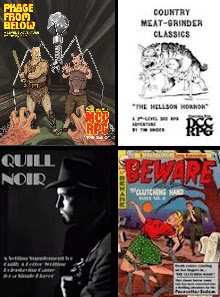Hey gang,
Today’s blog post is a bit of a rant session, so if you would rather read a game review or get a new monster for your RPG, this isn’t the post for you. If, however, you’d like to read the tirade of a frustrated GM, feel free to read on.
(One note: I’m paraphrasing and writing in generalities so that I don’t specifically ID or call out anyone. I may have been pissed when I wrote this, but I’m not 100% a dick.)
I had prepped a couple of online games for one of the conventions that was shifting to a virtual presence this year. I made contact with all players, sent out character sheets, and games were scheduled to begin later in the week. A few days later, one of the players contacted me as follows:
“Hi there. I finally got a chance to look over the character you sent me, and I must say, I’m underwhelmed. Do you run a particularly hardcore game with high stakes? If not, he’s not likely to survive. Looking at his hit points, he only has 6. Per the rulebook [snipped math calculations -TS] means this is the absolute minimum he can have. Also, he only has two mutations (one of them Infrasight, which is pretty useless) and, again, according to the rules [more snippage -TS] is the average number of mutations he could have. If you’re trying to have a fun con game, I find it odd you’d provide me with a character who is weak in every possible way. However, I can make it work, but just wanted to point this out to you.”
Huh. OK, so I wrote back and explained that the character was a straight random generation with no GM finagling. I also explained that the character in question had been played in three other games without fatality. In fact, the PC’s other mutation had been instrumental in those games. But if the player wanted another character, I’d send them one.
They wrote back:
“Thanks for the reply. I would suggest in the future that the characters you provide be more substantial for your players so they have more options to work with at the table. For example, when I run a game, I make sure to [snipped suggestions on how to “improve” PCs -TS]. However, I can make this character work, and it will probably be fun to play someone with these many detriments!”
Realizing they were not gonna let this go, I rolled up a new character that had more hit points, better ability scores, and four or five mutations. I sent it to the player as a replacement.
They wrote back:
“Hey, I said I was happy to play the character you sent me. If you’re being passive-aggressive about this, I don’t appreciate it. If you have something to say, just say it. Don’t beat around the bush.”
I snapped, and sent the following reply:
“I was willing to give you a new character because you’ve written to me twice now just to complain about what a crappy character you got. But if you want plain speak, here it is: I found your first email both insulting and condescending. The only passive-aggressiveness is coming from your direction. ‘My character sucks, but I’ll begrudgingly play it if I have to.’ Would you have launched into this diatribe if we had initially met at the table at a convention? Probably not. Your next email was telling me how I could do things better, as if I needed advice on how to improve the adventure I’ve written and run several times before. But the phrase that was over the line was, ‘If you’re trying to have a fun con game…’. I’m not ‘trying’ to have a fun game. I *do* have one. After 35 years of GMing at conventions, I think I have a pretty good notion on how to do it. And I’m stressed out enough trying to juggle 11 other players remotely without unsolicited advice on how I can ‘improve’ things.”
I wrapped up by saying all they needed to do was point out the PC seemed weak and if they could play something else or up the hit points a bit. Not a problem; I would’ve been happy to swap them out. But I didn’t need or want their unsolicited criticism.
The player must’ve been chastised or just didn’t see how they were coming across as they did send an apology as well as an offer to drop out of the game. It became a moot point as I needed to cancel my events due to a personal issue that surfaced.
Now that I have that off my chest, let me remind everyone that – even though we’ve moved to the slightly less personal “online world” – we still need to treat folks the way we’d treat them in person across the game table. GMs, your players have sought you out for the sole reason of having a good time. Treat them with respect because they’ve put their trust in you. Players, your GM has created a world for you to explore. Treat them with respect because they’ve put their trust in you.




























































.jpg)














No comments:
Post a Comment